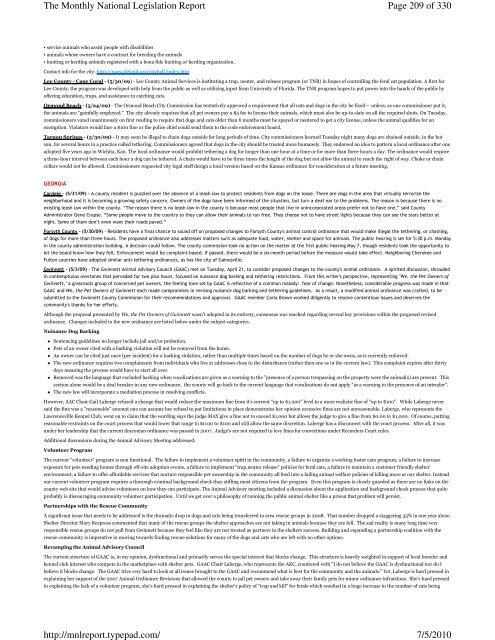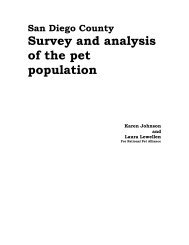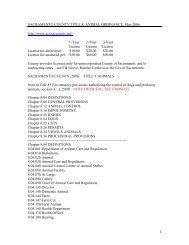Page 1 of 330 The Monthly National Legislation Report 7/5/2010 ...
Page 1 of 330 The Monthly National Legislation Report 7/5/2010 ...
Page 1 of 330 The Monthly National Legislation Report 7/5/2010 ...
Create successful ePaper yourself
Turn your PDF publications into a flip-book with our unique Google optimized e-Paper software.
<strong>The</strong> <strong>Monthly</strong> <strong>National</strong> <strong>Legislation</strong> <strong>Report</strong>http://mnlreport.typepad.com/<strong>Page</strong> 209 <strong>of</strong> <strong>330</strong>7/5/<strong>2010</strong>• service animals who assist people with disabilities• animals whose owners have a contract for breeding the animals• hunting or herding animals registered with a bona fide hunting or herding organization.Contact info for the city: http://www.deland.org/cityhall/index.htmLee County - Cape Coral - (5/30/09) - Lee County Animal Services is instituting a trap, neuter, and release program (or TNR) in hopes <strong>of</strong> controlling the feral cat population. A first forLee County, the program was developed with help from the public as well as utilizing input from University <strong>of</strong> Florida. <strong>The</strong> TNR program hopes to put power into the hands <strong>of</strong> the public by<strong>of</strong>fering education, traps, and assistance in catching cats.Ormond Beach - (5/24/09) - <strong>The</strong> Ormond Beach City Commission has tentatively approved a requirement that all cats and dogs in the city be fixed -- unless, as one commissioner put it,the animals are "gainfully employed." <strong>The</strong> city already requires that all pet owners pay a $5 fee to license their animals, which must also be up-to-date on all the required shots. On Tuesday,commissioners voted unanimously on first reading to require that dogs and cats older than 6 months must be spayed or neutered to get a city license, unless the animal qualifies for anexemption. Violators would face a $100 fine or the police chief could send them to the code enforcement board.Tarpon Springs - (5/30/09) - It may soon be illegal to chain dogs outside for long periods <strong>of</strong> time. City commissioners learned Tuesday night many dogs are chained outside, in the hotsun, for several hours in a practice called tethering. Commissioners agreed that dogs in the city should be treated more humanely. <strong>The</strong>y endorsed an idea to pattern a local ordinance after oneadopted five years ago in Wichita, Kan. <strong>The</strong> local ordinance would prohibit tethering a dog for longer than one hour at a time or for more than three hours a day. <strong>The</strong> ordinance would requirea three-hour interval between each hour a dog can be tethered. A chain would have to be three times the length <strong>of</strong> the dog but not allow the animal to reach the right <strong>of</strong> way. Choke or chaincollars would not be allowed. Commissioners requested city legal staff design a local version based on the Kansas ordinance for consideration at a future meeting.GEORGIACordele - (5/31/09) - A county resident is puzzled over the absence <strong>of</strong> a leash law to protect residents from dogs on the loose. <strong>The</strong>re are dogs in the area that virtually terrorize theneighborhood and it is becoming a growing safety concern. Owners <strong>of</strong> the dogs have been informed <strong>of</strong> the situation, but turn a deaf ear to the problems. <strong>The</strong> reason is because there is noexisting leash law within the county. “<strong>The</strong> reason there is no leash law in the county is because most people that live in unincorporated areas prefer not to have one,” said CountyAdministrator Gene Crapse. “Some people move to the country so they can allow their animals to run free. <strong>The</strong>y choose not to have street lights because they can see the stars better atnight. Some <strong>of</strong> them don’t even want their roads paved.”Forsyth County - (5/30/09) - Residents have a final chance to sound <strong>of</strong>f on proposed changes to Forsyth County's animal control ordinance that would make illegal the tethering, or chaining,<strong>of</strong> dogs for more than three hours. <strong>The</strong> proposed ordinance also addresses matters such as adequate food, water, shelter and space for animals. <strong>The</strong> public hearing is set for 5:30 p.m. Mondayin the county administration building. A decision could follow. <strong>The</strong> county commission took no action on the matter at the first public hearing May 7, though residents took the opportunity tolet the board know how they felt. Enforcement would be complaint-based. If passed, there would be a six-month period before the measure would take effect. Neighboring Cherokee andFulton counties have adopted similar anti-tethering ordinances, as has the city <strong>of</strong> Gainesville.Gwinnett - (5/3/09) - <strong>The</strong> Gwinnett Animal Advisory Council (GAAC) met on Tuesday, April 21, to consider proposed changes to the county's animal ordinance. A spirited discussion, shroudedin contemptuous overtones that pervaded for two plus hours, focused on nuisance dog barking and tethering restrictions. From this writer's perspective, representing "We, the Pet Owners <strong>of</strong>Gwinnett," a grassroots group <strong>of</strong> concerned pet owners, the feeling tone set by GAAC is reflective <strong>of</strong> a common malady: fear <strong>of</strong> change. Nonetheless, considerable progress was made in thatGAAC and We, the Pet Owners <strong>of</strong> Gwinnett each made compromises in revising nuisance dog barking and tethering guidelines. As a result, a modified animal ordinance was crafted, to besubmitted to the Gwinnett County Commission for their recommendations and approval. GAAC member Carla Brown worked diligently to resolve contentious issues and deserves thecommunity's thanks for her efforts.Although the proposal presented by We, the Pet Owners <strong>of</strong> Gwinnett wasn't adopted in its entirety, consensus was reached regarding several key provisions within the proposed revisedordinance. Changes included in the new ordinance are listed below under the subject categories.Nuisance Dog BarkingSentencing guidelines no longer include jail and/or probation.Pets <strong>of</strong> an owner cited with a barking violation will not be removed from the home.An owner can be cited just once (per incident) for a barking violation, rather than multiple times based on the number <strong>of</strong> dogs he or she owns, as is currently enforced.<strong>The</strong> new ordinance requires two complainants from individuals who live at addresses close to the disturbance (rather then one as in the current law). This complaint expires after thirtydays meaning the process would have to start all over.Removed was the language that excluded barking when vocalizations are given as a warning to the "presence <strong>of</strong> a person trespassing on the property were the animal(s) are present. Thissection alone would be a deal breaker in any new ordinance, the county will go back to the current language that vocalizations do not apply "as a warning to the presence <strong>of</strong> an intruder".<strong>The</strong> new law will incorporate a mediation process in resolving conflicts.However, AAC Chair Gail Laberge refused a change that would reduce the maximum fine from it's current "up to $1,000" level to a more realistic fine <strong>of</strong> "up to $100". While Laberge neversaid the fine was a "reasonable" amount one can assume her refusal to put limitations in place demonstrates her opinion excessive fines are not unreasonable. Laberge, who represents theLawrenceville Kennel Club, went on to claim that the wording says the judge MAY give a fine not to exceed $1,000 but allows the judge to give a fine from $0.00 to $1,000. Of course, puttingreasonable restraints on the court process that would lower that range to $0.00 to $100 and still allow the same discretion. Laberge has a disconnect with the court process. After all, it wasunder her leadership that the current draconian ordinance was passed in 2007. Judge's are not required to levy fines for convictions under Recorders Court rules.Additional discussions during the Animal Advisory Meeting addressed:Volunteer Program<strong>The</strong> current "volunteer" program is non functional. <strong>The</strong> failure to implement a volunteer spirit in the community, a failure to organize a working foster care program, a failure to increaseexposure for pets needing homes through <strong>of</strong>f-site adoption events, a failure to implement "trap,neuter release" policies for feral cats, a failure to maintain a customer friendly shelterenvironment, a failure to <strong>of</strong>fer affordable services that nurture responsible pet ownership in the community all feed into a failing animal welfare policies <strong>of</strong> killing more at our shelter. Insteadour current volunteer program requires a thorough criminal background check thus stifling most citizens from the program. Even this program is closely guarded as there are no links on thecounty web site that would advise volunteers on how they can participate. <strong>The</strong> Animal Advisory meeting included a discussion about the application and background check process that quiteprobably is discouraging community volunteer participation. Until we get over a philosophy <strong>of</strong> running the public animal shelter like a prison that problem will persist.Partnerships with the Rescue CommunityA significant issue that needs to be addressed is the dramatic drop in dogs and cats being transferred to area rescue groups in 2008. That number dropped a staggering 35% in one year alone.Shelter Director Mary Respress commented that many <strong>of</strong> the rescue groups the shelter approaches are not taking in animals because they are full. <strong>The</strong> sad reality is many long time veryresponsible rescue groups do not pull from Gwinnett because they feel like they are not treated as partners in the shelters success. Building and expanding a partnership coalition with therescue community is imperative in moving towards finding rescue solutions for many <strong>of</strong> the dogs and cats who are left with no other options.Revamping the Animal Advisory Council<strong>The</strong> current structure <strong>of</strong> GAAC is, in my opinion, dysfunctional and primarily serves the special interest that blocks change. This structure is heavily weighted in support <strong>of</strong> local breeder andkennel club interest who compete in the marketplace with shelter pets. GAAC Chair Laberge, who represents the AKC, countered with "I do not believe the GAAC is dysfunctional nor do Ibelieve it blocks change. <strong>The</strong> GAAC tries very hard to look at all issues brought to the GAAC and recommend what is best for the community and the animals." Yet, Laberge is hard pressed inexplaining her support <strong>of</strong> the 2007 Animal Ordinance Revisions that allowed the county to jail pet owners and take away their family pets for minor ordinance infractions. She's hard pressedin explaining the lack <strong>of</strong> a volunteer program, she's hard pressed in explaining the shelter's policy <strong>of</strong> "trap and kill" for ferals which resulted in a huge increase in the number <strong>of</strong> cats being




